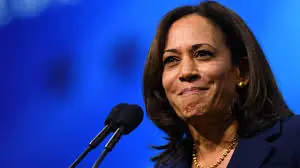
Order Michael Finch’s new book, A Time to Stand: HERE. Prof. Jason Hill calls it “an aesthetic and political tour de force.”
Sign up to attend Michael’s talk in Los Angeles on Thursday, November 20: HERE.
Failed presidential candidate Kamala Harris raised eyebrows recently when she claimed that “some people have said I was the most qualified candidate ever to run for president.” Those people, if they exist, should be subjected to rigorous drug testing, but even if it were true that Kamala Harris was the most qualified presidential candidate ever, it wouldn’t prove anything. After all, the man who was really the most qualified presidential candidate ever was one of the worst presidents the nation ever had until the dark days of Carter, Clinton, Obama, and Biden.
On paper, James Buchanan looked better qualified to be president of the United States than virtually everyone else in the country. He had been a member of the Pennsylvania House of Representatives and then, for ten years, a U.S. representative from that state. Andrew Jackson then sent him to Saint Petersburg as U.S. minister to Russia; when he returned, he served another ten years in Congress, this time in the Senate. He was secretary of state in the James K. Polk administration and minister to Britain in the Franklin Pierce administration. He had tried unsuccessfully for the Democratic Party’s presidential nomination in 1844, 1848, and 1852.
In 1856, it was finally his turn. He won the nomination and was duly elected, and ended up overseeing the dissolution of the nation he had been elected to preserve, protect and defend. In late 1860 and early 1861, just weeks after the election of Republican Abraham Lincoln to be Buchanan’s successor as president, seven Southern states seceded from the Union: South Carolina, Mississippi, Florida, Alabama, Georgia, Louisiana, and Texas.
In his last annual message to Congress on December 3, 1860, Buchanan appeared to justify secession, stating: “The long-continued and intemperate interference of the Northern people with the question of slavery in the Southern States has at length produced its natural effects.” He lamented that “for five and twenty years the agitation at the North against slavery has been incessant” and exclaimed: “How easy would it be for the American people to settle the slavery question forever and to restore peace and harmony to this distracted country!” All that was needed to do that, he said, was to allow the South “to be let alone and permitted to manage their domestic institutions in their own way.” Yet that, given what most in the North believed about slavery, was no longer possible.
Buchanan believed the South was right on constitutional grounds in the nation’s grand dispute over slavery and suggested that it had a right to secede if its rights were not respected: “The Southern States, standing on the basis of the Constitution, have right to demand this act of justice from the States of the North. Should it be refused, then the Constitution, to which all the States are parties, will have been willfully violated by one portion of them in a provision essential to the domestic security and happiness of the remainder. In that event the injured States, after having first used all peaceful and constitutional means to obtain redress, would be justified in revolutionary resistance to the Government of the Union.”
Buchanan waffled. While denying that states had a right to secede from the Union, he added: “The right of resistance on the part of the governed against the oppression of their governments cannot be denied,” referring to the slaveholders, not the slaves, as the victims of that oppression.
A month later, Buchanan declared in a statement on “Threats to the Peace and Existence of the Union” that “no State has a right by its own act to secede from the Union or throw off its federal obligations at pleasure,” and that “the right and the duty to use military force defensively against those who resist the Federal officers in the execution of their legal functions and against those who assail the property of the Federal Government is clear and undeniable.” But on January 9, 1861, when South Carolinians fired upon the ship he sent to reinforce the Union garrison at Fort Sumter, off the coast of Charleston, he did nothing.
Buchanan was still president when the first seven Southern states left the Union, but his term would expire on March 4, 1861, and for the last months of his presidency, all he did was run out the clock. He did nothing to stop secession, arguing that it was not within his powers to do so, and simply handed off the problem to his successor.
His failure to address this greatest of the nation’s crises was the last in a series of mistakes and
demonstrations of weakness that had characterized his presidency. This most qualified of presidential candidates turned out to be one of the most wholly unfit people ever to occupy the White House. Kamala Harris would have rivaled him.
















